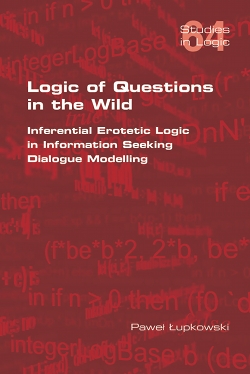|
|
|

Studies in Logic
 Back Back
 | Logic of Questions in the Wild
Inferential Erotetic Logic in Information Seeking Dialogue Modelling
Pawel Lupkowski
The book considers reasoning with questions involved in natural language dialogues. The first chapter shows the main points of interests in this area: the issue of the justification for raising a question in a dialogue, the informative content of the act of questioning in interaction with other agents, question relevance and questioning as a strategic process. Considerations of all these issues might be found among the topics of IEL as presented in the second chapter of this book. In what followed the logical ideas were tested and employed for analyses of natural language dialogues retrieved from language corpora. The main result obtained in the third chapter is that erotetic implication and erotetic search scenarios may be successfully used for such a task. The fourth chapter is meant as an integration of linguistic and logical intuitions and concepts. The aim is achieved in the formal dialogue systems presented there. The formalism used in this chapter uses IEL ideas as an underpinning and allows us to grasp the aforementioned issues connected with questions in interaction. The last chapter of this book might be seen as an attempt to take the obtained results one step further. The idea is to involve the logic of questions in solving a practical problem of human-computer interaction related to cooperative answering. <
>
8 June 2016
978-1-84890-216-9
Buy from Amazon: UK US
For Digital Download:Click here
|
|
|

